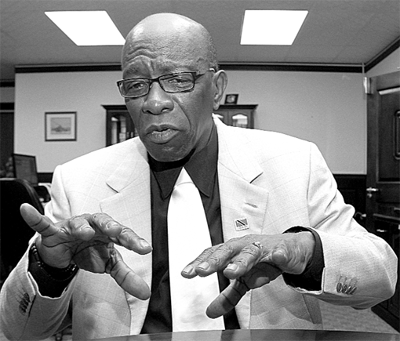(Trinidad Guardian) Criticisms are mounting over plans by National Security Minister Jack Warner to set up five army bases around T&T, immediately after granting powers of arrest to 1,000 precepted soldiers. The outcry has come from the business sector and non-governmental organisations who believe that Warner is making a mistake by not implementing a proper legislative framework to regulate the conduct of soldiers.

President of the Penal/Debe Chamber of Industry and Commerce Sahid Hosein said an emergency meeting was being organised to discuss Warner’s latest move. “We are uneasy about his plan to precept 1,000 soldiers and set up army bases. If this is not properly managed, it will create a real crisis for our citizens,” Hosein said.
He said there was lawlessness in every institution of the country, including the regiment, so there was a grave possibility that there could be abuse. “We have to put systems in place to prevent abuse of power,” Hosein said. Meanwhile, president of Fixin’ T&T Kirk Waithe said Warner should be stripped of his ministerial portfolio and removed from the National Security Council because he could not be trusted with law enforcement.
“We run the risk of becoming a military state if these measures are implemented. I don’t support army bases being set up anywhere,” Waithe said. He argued that instead of giving the soldiers powers of arrest, Warner should focus on providing proper equipment and better working conditions for the police.
“We need to find ways of motivating the police. Warner has demonstrated that he has no regard for process, and we consider him to be a threat not only to our international reputation but also to our constitution, democracy and our citizenry,” Waithe said. President of the Police Social and Welfare Association Sgt Anand Ramesar accused Warner of ignoring the concerns of the association.
He warned that the police would not co-operate with the soldiers unless there was proper consultation. “If Warner doesn’t take into account our concerns, our relationship with the soldiers could be seriously affected. It will not work out in terms of co-operation. It is not too difficult for us to reflect on this with a delayed approach and with considerable thought. We could rest and reflect,” Ramesar said.
He added that during the state of emergency last year, a number of people were arrested by soldiers but their detention could not be justified by the officers. “We are concerned that two parallel bodies, equally vested with the same powers and serving two leaders, could create real problems. We believe that all persons with powers of arrest should fall under the Commissioner of Police,” Ramesar said.
He recommended that Government fast-track the Special Reserve Police recruitment, as well as rehiring retired specialised police officers to fight crime. Ramesar also warned that the Government should refrain from mimicking foreign crime-fighting strategies without recalibrating them to suit local conditions.
He said even if armies abroad were used to fight crime, this might not work in T&T because there was no proper legislative framework to regulate conduct. He said that if abuse of power occurred with the police, disciplinary action could be taken by the Police Service Commission, the Police Complaints Authority or the internal disciplinary committee.
However, president of the San Fernando Business Association Daphne Bartlett said the move to grant powers of arrests to soldiers was long overdue, and the army bases were being set up at key points where there could be careful monitoring of the coasts. “We support the locations that Mr Warner chose, because he acknowledged recently how porous our borders are,” Bartlett said.
She suggested systems could be set up by the State to regulate the conduct of soldiers to ensure there was no abuse of power. On Monday, Warner called out all the armed forces to help in the fight against crime. He said army bases would be set up at Toco, Guayaguayare and Moruga along with its established bases at Teteron, Chaguaramas and Cumuto, La Romaine and Carapo.




